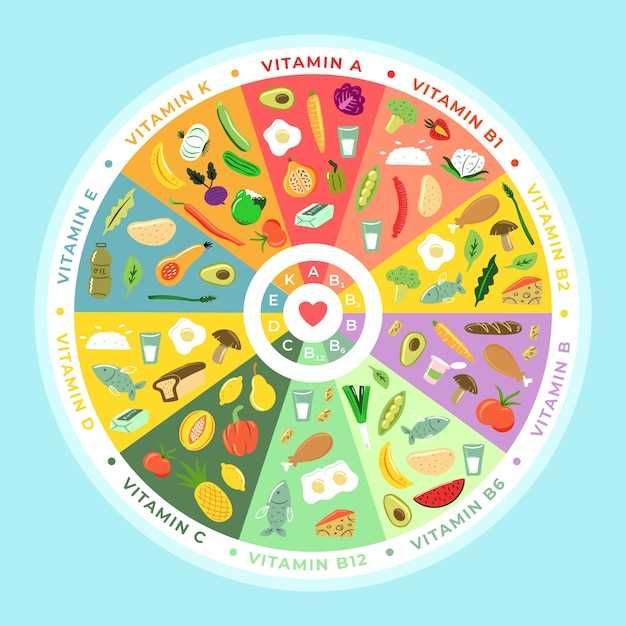
In the realm of wellness and vitality, there exists a fundamental aspect that lies at the core of our physical and mental well-being. It is a concept that transcends mere sustenance and nourishment, encompassing the delicate art of harmonizing our dietary choices to achieve optimal health. This concept, often referred to as the cornerstone of a balanced lifestyle, revolves around the notion of creating a symphony of nutrients on our plates.
As we embark on this journey towards mastering the essentials of nutrition, it is crucial to understand that our bodies are intricate systems, finely tuned to function at their best when provided with a diverse array of vital elements. By embracing the power of variety, we unlock the potential to fuel our bodies with an abundance of vitamins, minerals, and antioxidants, each playing a unique role in fortifying our overall well-being.
Within the realm of nutrition, the art of crafting a harmonious dish lies not only in the selection of ingredients but also in the careful consideration of their proportions. Just as a symphony requires a delicate balance of instruments to create a masterpiece, our plates too demand a thoughtful arrangement of macronutrients – proteins, carbohydrates, and fats – to achieve a harmonious blend that nourishes both body and mind.
While the concept of a balanced plate may seem elusive, it is within our grasp to create a symphony of flavors and textures that not only tantalize our taste buds but also provide the essential building blocks for a vibrant and thriving existence. By embracing the principles of nutrition, we embark on a journey of self-discovery, where the art of crafting a harmonious dish becomes a testament to our commitment to holistic well-being.
The Importance of a Balanced Diet for Optimal Health
Attaining optimal health is closely tied to maintaining a well-balanced diet. A diet that is balanced in its composition and nutrient content plays a crucial role in supporting overall well-being and vitality. It is essential to understand the significance of consuming a variety of foods that provide the necessary nutrients for the body to function optimally.
A balanced diet encompasses the consumption of a wide range of food groups, including fruits, vegetables, whole grains, lean proteins, and healthy fats. Each of these food groups contributes unique nutrients that are vital for various bodily functions. Fruits and vegetables, for instance, are rich in vitamins, minerals, and antioxidants, which help strengthen the immune system and protect against chronic diseases.
Whole grains, such as brown rice and whole wheat bread, are excellent sources of fiber, which aids in digestion and helps maintain a healthy weight. Lean proteins, such as poultry, fish, and legumes, provide essential amino acids that support muscle growth and repair. Healthy fats, found in foods like avocados, nuts, and olive oil, are essential for brain function, hormone production, and the absorption of fat-soluble vitamins.
By consuming a balanced diet, individuals can ensure that their bodies receive the necessary nutrients in the right proportions. This helps prevent nutrient deficiencies and promotes overall health and well-being. Additionally, a balanced diet can help regulate blood sugar levels, maintain a healthy weight, and reduce the risk of chronic diseases, such as heart disease, diabetes, and certain types of cancer.
In conclusion, a balanced diet is crucial for optimal health as it provides the body with a diverse array of nutrients necessary for various bodily functions. By incorporating a variety of food groups into daily meals, individuals can support their overall well-being and reduce the risk of developing chronic diseases. Emphasizing the importance of a balanced diet is essential in promoting a healthy lifestyle and ensuring long-term vitality.
Understanding Macronutrients: Carbohydrates, Proteins, and Fats
In this section, we will delve into the essential components of our diet known as macronutrients. These macronutrients include carbohydrates, proteins, and fats, which play crucial roles in maintaining our overall health and well-being. By understanding the importance of each macronutrient and how they contribute to our body’s functions, we can make informed choices about our diet and create a balanced plate.
Carbohydrates, often referred to as carbs, are a primary source of energy for our bodies. They are found in various foods such as grains, fruits, vegetables, and legumes. Carbs provide fuel for our brain, muscles, and organs, allowing us to perform daily activities and exercise. It is important to choose complex carbohydrates, such as whole grains, as they provide a steady release of energy and are rich in fiber, vitamins, and minerals.
Proteins are the building blocks of our body and are essential for growth, repair, and maintenance of tissues. They are found in foods like meat, poultry, fish, eggs, dairy products, legumes, and nuts. Proteins are made up of amino acids, which are necessary for the production of enzymes, hormones, and antibodies. Including a variety of protein sources in our diet ensures that we obtain all the essential amino acids our body needs.
Fats, often misunderstood, are an important part of a healthy diet. They provide energy, help absorb vitamins, and support cell growth. There are different types of fats, including saturated fats, unsaturated fats, and trans fats. Saturated fats, found in animal products and some plant-based oils, should be consumed in moderation. Unsaturated fats, found in foods like avocados, nuts, and olive oil, are beneficial for heart health. Trans fats, found in processed and fried foods, should be avoided as they increase the risk of heart disease.
By understanding the role of carbohydrates, proteins, and fats in our diet, we can make informed choices to create a balanced plate. It is important to include a variety of foods from each macronutrient group to ensure we obtain all the necessary nutrients for optimal health. Remember, moderation and balance are key when it comes to nutrition.
The Role of Micronutrients: Vitamins and Minerals

In the realm of nutrition, there exists a crucial group of nutrients known as micronutrients. These tiny yet mighty substances play a vital role in maintaining our overall health and well-being. Specifically, we refer to vitamins and minerals, which are essential for various bodily functions and processes.
Vitamins are organic compounds that our bodies require in small amounts to function optimally. They act as catalysts, facilitating numerous biochemical reactions that are necessary for growth, development, and maintenance. Vitamins can be classified into two categories: fat-soluble and water-soluble. Fat-soluble vitamins, such as vitamins A, D, E, and K, are stored in the body’s fatty tissues and can be utilized when needed. On the other hand, water-soluble vitamins, including the B vitamins and vitamin C, are not stored and must be consumed regularly through our diet.
Minerals, on the other hand, are inorganic substances that are essential for various physiological functions. They are involved in processes such as bone formation, nerve transmission, and fluid balance. Minerals can be categorized into two groups: macrominerals and trace minerals. Macrominerals, such as calcium, magnesium, and potassium, are required in larger amounts, while trace minerals, including iron, zinc, and copper, are needed in smaller quantities.
Overall, vitamins and minerals are indispensable components of a well-balanced diet. They work synergistically to support our body’s functions and ensure optimal health. By incorporating a variety of nutrient-rich foods into our meals, we can ensure an adequate intake of these micronutrients and promote overall well-being.
Building a Balanced Plate: Portion Control and Food Groups
Creating a well-balanced plate involves understanding the importance of portion control and incorporating a variety of food groups. By carefully managing the amount of food we consume and ensuring a diverse range of nutrients, we can optimize our overall health and well-being.
The Role of Portion Control
Portion control plays a crucial role in maintaining a balanced diet. It involves being mindful of the quantity of food we eat and avoiding excessive portions. By controlling our portion sizes, we can prevent overeating and maintain a healthy weight. It is important to note that portion control does not mean depriving ourselves of certain foods but rather finding a balance that suits our individual needs.
Incorporating Food Groups
A balanced plate should include a variety of food groups to ensure we receive all the essential nutrients our bodies need. These food groups include fruits, vegetables, grains, protein, and dairy (or dairy alternatives). Each food group provides unique benefits and contributes to our overall health. By incorporating a diverse range of food groups, we can ensure we are getting a wide array of vitamins, minerals, and macronutrients.
When building a balanced plate, it is helpful to follow the MyPlate guidelines, which recommend filling half of our plate with fruits and vegetables, one-quarter with grains, and one-quarter with protein. This visual representation can guide us in creating a well-balanced meal that includes a variety of nutrients.
- Fruits and vegetables: These should make up a significant portion of our plate, providing essential vitamins, minerals, and fiber.
- Grains: Whole grains such as brown rice, quinoa, and whole wheat bread are excellent sources of fiber and provide sustained energy.
- Protein: Lean sources of protein like chicken, fish, beans, and tofu are important for muscle growth and repair.
- Dairy or dairy alternatives: These provide calcium and other essential nutrients for bone health. Options include milk, yogurt, and fortified plant-based alternatives.
By building a balanced plate that incorporates portion control and a variety of food groups, we can ensure we are nourishing our bodies with the necessary nutrients for optimal health and well-being.
Healthy Eating Habits: Incorporating Whole Foods and Limiting Processed Foods

Developing healthy eating habits is essential for maintaining a well-balanced diet and promoting overall wellness. One important aspect of healthy eating is incorporating whole foods into your meals while limiting the consumption of processed foods.
When we talk about whole foods, we refer to natural, unprocessed foods that are as close to their original state as possible. These foods are rich in essential nutrients, including vitamins, minerals, and antioxidants, which are vital for our body’s optimal functioning. Whole foods include fruits, vegetables, whole grains, lean proteins, and healthy fats.
Incorporating whole foods into your diet can provide numerous benefits. They are typically lower in added sugars, sodium, and unhealthy fats compared to processed foods. Whole foods also tend to be higher in fiber, which aids in digestion and helps maintain a healthy weight. Additionally, they offer a wide range of flavors, textures, and colors, making meals more enjoyable and satisfying.
On the other hand, processed foods undergo various manufacturing processes that often involve the addition of preservatives, artificial flavors, and unhealthy additives. These foods are typically high in refined sugars, unhealthy fats, and sodium, which can contribute to weight gain, heart disease, and other health issues when consumed in excess.
By limiting the consumption of processed foods and focusing on whole foods, you can improve your overall nutrition and reduce the risk of chronic diseases. It is important to read food labels carefully and choose products with minimal ingredients and no added sugars or artificial additives. Preparing meals at home using fresh, whole ingredients is also a great way to ensure you are getting the most nutritional value from your food.
In conclusion, adopting healthy eating habits involves incorporating whole foods into your diet while limiting the intake of processed foods. By making this shift, you can enhance your overall well-being and promote a balanced and nutritious eating pattern.
Practical Tips for Achieving a Well-Balanced Meal on a Budget
When it comes to maintaining a healthy diet, it’s important to ensure that your meals are both nutritious and affordable. Here are some practical tips to help you create a well-balanced plate without breaking the bank.
- Opt for seasonal and local produce: Choosing fruits and vegetables that are in season not only ensures freshness and flavor but also tends to be more budget-friendly. Additionally, buying from local farmers’ markets or joining a community-supported agriculture (CSA) program can often provide affordable options.
- Incorporate protein-rich plant-based foods: Plant-based proteins such as beans, lentils, tofu, and tempeh are not only cost-effective but also offer a wide range of health benefits. Including these options in your meals can help you meet your protein needs without relying heavily on expensive animal products.
- Plan your meals in advance: Taking the time to plan your meals for the week can help you make more informed choices and avoid unnecessary spending. By creating a shopping list based on your planned meals, you can ensure that you only buy what you need and reduce food waste.
- Buy in bulk: Purchasing staple foods like grains, legumes, and nuts in bulk can save you money in the long run. Look for bulk bins at your local grocery store or consider joining a food co-op to access affordable options.
- Make use of leftovers: Instead of letting leftovers go to waste, get creative and repurpose them into new meals. For example, leftover roasted vegetables can be added to a salad or used as a filling for a wrap. This not only saves money but also adds variety to your meals.
- Compare prices and shop smart: Before making a purchase, compare prices at different stores or online platforms to ensure you’re getting the best deal. Additionally, consider using coupons, taking advantage of sales, and buying generic brands to save money without compromising on nutrition.
- Focus on whole foods: Processed and pre-packaged foods often come with a higher price tag. By prioritizing whole foods like fruits, vegetables, whole grains, and lean proteins, you can create a well-balanced plate while keeping costs down.
By implementing these practical tips, you can create a balanced plate that meets your nutritional needs without straining your budget. Remember, eating well doesn’t have to be expensive!
